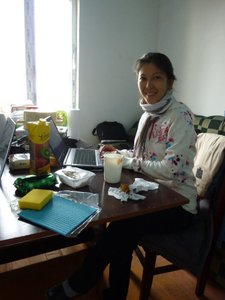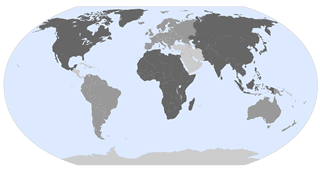Advertisement
Published: October 2nd 2011

 Gaziza
Gaziza
Gaziza at work in the 'office'Fate often plays a hand in people’s lives and this seemed to be the case for myself and my new Kazakh co-researcher. The project needed to find a Researcher/translator within Kazakhstan and Zhar had kindly forwarded a couple of potential CVs. One was unsuitable as they were a full-time student so in the end I arranged to interview just one, a young teacher of English with a glowing CV of awards and achievements.
Gaziza arrived at the hotel on time and we were soon deep in conversation as I explained the project and she explained her career history and documents. Friendly, intelligent and well-spoken, Gaziza seemed like the ideal candidate and by the end of the interview I was convinced and asked if she would like to join us. She seemed surprised and delighted and asked if she should then cancel other interviews. Not to lose her elsewhere, I said yes and it was fortunate that I did so. The next day she joined me and said that she had only just arrived in Almaty the day before, had sent around her CV just prior to arriving and should have had an interview with an oil company a couple of

 House
House
The house in Aidarlyhours before my interview but luckily it had been postponed. The work we offered interested her and would give her time to apply for her goal of studying for a Masters or PhD abroad.
The next couple of days we spent rushing around Almaty shopping in preparation to go to the countryside. This highlighted a couple of instances of post-Soviet bureaucracy that I did not expect. Firstly, we asked to take some used cardboard boxes from a supermarket for easy packing of food but were refused by the security guard as the appropriate person was not available to ask permission. Second, we bought an expensive propane gas stove for cooking from a fishing suppliers as we did not know where else to get one but when we tried to get it filled at a number of petrol stations they said that it was not allowed. Simple things that I take for granted may be problematic here.
We had previously found a village in which we could start our work and, with the help of contacts, an old house that we could rent. So early one morning we set off loaded with bags of clothes, equipment and food. Once

 Backyard
Backyard
Our backyard full of scrapwe had left the traffic of Almaty we sped along the highway and the scenery changed from industrial to farming suburbs and then to more open steppes. But unlike Mongolia, there seemed few livestock in this open grassland. After about two hours of easy driving, bliss after the 14 hour off-road drives in Mongolia, we arrived at our study village and were greeted by Kalan, our host.
Kalan is an oralman, or returnee Kazakh. He and most of his family had returned to Kazakhstan from Mongolia after privatisation. Although friendly, he was a little confused and embarrassed as he had not expected us so soon so the house we had been promised was not ready and in the middle of being renovated. Our taxi driver quickly dumped our bags and departed as we were led around a very grimy, dusty building with crumbling ceilings, bare gritty floorboards and brand new double glazed windows. Kalan was just about to depart for a wedding in Astana for a few days and very quickly with the help of his wife and sister we washed the place down a little. I was given an old carpet on which I could put my thermarest

 horse
horse
the horses in Kazakhstan are big and saddles comfortable.and Gaziza opted for a narrow sofa after it was given a wipe down. A cooker was found for us and we were shown the ‘fresh’ water tank outside the front door and the rotting wooden ‘loo’ through the yard at the back of the house. A couple of hours later we were left to get on with our research.
Gaziza and I did the best we could to set up house. We set out our food on a table and laid out our sleeping bags. After a meal of vegetables and rice and a walk round the village to get our bearings we resigned ourselves to our new home. The first night I was woken at about 5am by a rustling and turning over found a mouse gazing curiously at me a few inches from my face. Not the best thing to wake up to. But slowly over the next few days we got used to the house and the company.
The back yard of the house is a scrap yard of exSoviet machinery and we soon realised that Kalan had a collection of rusting vehicles from almost every year that he has lived here and probably

 Gazizas camel
Gazizas camel
Gaziza tries riding a camel for the first timedecades before. This collection makes night time excursions to the loo quite spooky, particularly when the resident cow decides to make an appearance too.
Washing facilities in our house were also lacking but Kalan offered the use of his moncha (steam room) and Gaziza stoked the boiler with wood and dung so we could, in turn, relish the steamy heat of a hot bucket shower. The steam room itself was old and I had to be careful not to touch the hot rusty boiler or get scalded by the jet of boiling water when turning on the tap but it was worth it to feel clean. Later we found someone else with a much more salubrious monsha who let us steam away occasionally to get clean.
The village of Aidarly is pleasantly green with a seasonal canal running round the southern edge and channels making their leaky way along the edges of streets. Trees shade the single story houses and donkeys and dogs wander round aimlessly. There is a lively school, a mosque, several small shops and a new centre being built to hold a cinema, library and meeting rooms. The streets are neat and tidy after a

 Ki'iz Ui
Ki'iz Ui
The Kazakh Ui has a taller roof than Mongolian gersclean up campaign led by the village akim (local governor).
We spent the first few days trying to track down and interview
some of the village herders although many of them were staying out in the pasture with their animals. Without our own transport, we decided to postpone meeting these people until we found a car and driver. But we gradually found a few people to talk to and started to gather some fascinating stories. Many of the residents are oralmans, mostly from Mongolia but also from China. They have returned over the last 20 years to live in the land of their ancestors. Many have settled in Aidarly because of the good pasture and land for crops although all complained about the lack of water which limits livestock breeding activities. One old oralman from China with a wispy beard told how he had had to leave his livestock behind and that here he could not buy so many animals here because of lack of good pasture to buy or rent from the government.
It always delights me how generous people are when we, as strangers, turn up to talk to them and the life stories we gathered

 Embroidery
Embroidery
Many of the Kazakh women make patchwork covers to earn a small incomewere varied and interesting. We were warmly welcomed by an old man who had few animals and little income. His daughter in law made us tea and told us that despite having qualified with a diploma in agronomy she had no prospect of work and was bringing up her 3 children. An old lady originally from Uzbekhistan insisted in giving us tea with homemade bread and jams, showed us her garden full of dahlias and tomatoes, then insisted we returned later for lunch of palao rice accompanied by delicious home-bottled vegetables. She talked and gossiped non-stop through both meals of how she had managed to keep her house despite ‘others’ trying to take it from her, how she gave up keeping cows after several were stolen and how her youngest son was shy of girls and unmarried at 38. Another old lady, originally from Kyrgistan chatted merrily in Russian about life in the village. She, like most people, complained about lack of water and the salty drinking water in the village. This causes kidney stones and liver problems so we quickly decided to make our tea from bottled water both for the taste and health reasons. In the Soviet period

 Kazakh embroidery
Kazakh embroidery
Typical of embroidery used in the Kazakh ui (Kazakh ger)fresh water was brought to the village in trucks but now it is from a local source.
Growing melons and watermelons is another way of earning an income for residents of Aidarly. Much to our delight we found six assorted melons waiting on our doorstep one day from an unknown benefactor. As our ‘fresh’ water is salty this makes a lovely way to quench our thirst. Although the village shops are small and have limited provisions there are more opportunities to get fresh vegetables here at this time of year than Mongolia. One of the village shopkeepers gave us some delicious tomatoes fresh from her own garden.
Kalan returned a few days later and assisted us to visit other areas. He is one of the richer returnees from Mongolia and has several hundred animals and owns a large area of land. Poorer herders may have only 10 or 20 animals and pay for grazing rights on others’ land. Kalan is a generous benefactor and has helped some of the poorer herders get started by giving them a few cattle and allowing them to graze them on his land in return for herding his own livestock. We went to

 Aidarly
Aidarly
The main road into Aidarlymeet some of them one day and they explained their hope that in the future they could afford to buy their own pieces of land and maybe join together to use the land more sustainably but bureaucratic restrictions seem to make this difficult.
Our stay in the village ended with a group meeting with few herders which was a noisy and argumentative occasion. I have learnt that Kazakhs are not shy in expressing their opinion. Perhaps after years of Soviet rule they are expressing their frustrations at the past and present situations. Kazakhstan is embracing capitalism but people have to find a way to cope with private ownership of property and loss of state support. The UNDP have given some aid in this village including Kazakh ui for use in the remote pastures and clearing wells that have silted up. Kazakh ui are the equivalent to the Mongolian ger or yurt. As nomadic pastoralism all but died out in Soviet times, people moved to settled houses but still need mobile homes in the pasture. These give herders shelter as they look after their animals. The UNDP also give training in pasture management that has changed drastically through the different
political circumstances. It is a difficult problem to balance aspirations for development through private ownership and sustainable use of environmental resources.
I am now back in Almaty and will be having a short holiday with Joan and Nikki, friends from home, when they wake up from their early morning landing!
Advertisement
Tot: 0.05s; Tpl: 0.012s; cc: 10; qc: 28; dbt: 0.022s; 1; m:domysql w:travelblog (10.17.0.13); sld: 1;
; mem: 1.1mb
















